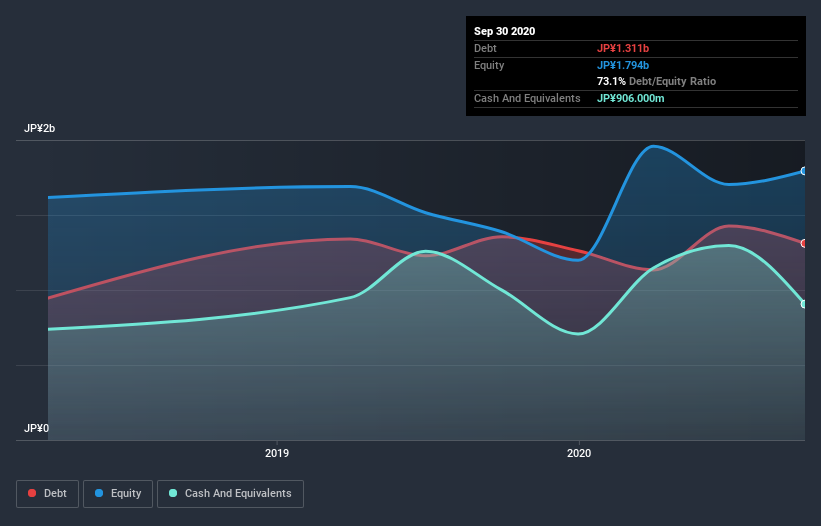Some say volatility, rather than debt, is the best way to think about risk as an investor, but Warren Buffett famously said that 'Volatility is far from synonymous with risk.' So it might be obvious that you need to consider debt, when you think about how risky any given stock is, because too much debt can sink a company. As with many other companies Nextgen,Inc. (TYO:3842) makes use of debt. But the more important question is: how much risk is that debt creating?
What Risk Does Debt Bring?
Debt assists a business until the business has trouble paying it off, either with new capital or with free cash flow. Part and parcel of capitalism is the process of 'creative destruction' where failed businesses are mercilessly liquidated by their bankers. While that is not too common, we often do see indebted companies permanently diluting shareholders because lenders force them to raise capital at a distressed price. Of course, debt can be an important tool in businesses, particularly capital heavy businesses. When we think about a company's use of debt, we first look at cash and debt together.
View our latest analysis for NextgenInc
What Is NextgenInc's Net Debt?
As you can see below, NextgenInc had JP¥1.31b of debt, at September 2020, which is about the same as the year before. You can click the chart for greater detail. However, it also had JP¥906.0m in cash, and so its net debt is JP¥405.0m.

How Strong Is NextgenInc's Balance Sheet?
Zooming in on the latest balance sheet data, we can see that NextgenInc had liabilities of JP¥1.51b due within 12 months and liabilities of JP¥457.0m due beyond that. Offsetting these obligations, it had cash of JP¥906.0m as well as receivables valued at JP¥1.28b due within 12 months. So it actually has JP¥219.0m more liquid assets than total liabilities.
This surplus suggests that NextgenInc has a conservative balance sheet, and could probably eliminate its debt without much difficulty. There's no doubt that we learn most about debt from the balance sheet. But you can't view debt in total isolation; since NextgenInc will need earnings to service that debt. So when considering debt, it's definitely worth looking at the earnings trend. Click here for an interactive snapshot.
In the last year NextgenInc wasn't profitable at an EBIT level, but managed to grow its revenue by 19%, to JP¥4.0b. We usually like to see faster growth from unprofitable companies, but each to their own.
Caveat Emptor
Importantly, NextgenInc had an earnings before interest and tax (EBIT) loss over the last year. Its EBIT loss was a whopping JP¥425m. On a more positive note, the company does have liquid assets, so it has a bit of time to improve its operations before the debt becomes an acute problem. But we'd want to see some positive free cashflow before spending much time on trying to understand the stock. This one is a bit too risky for our liking. When analysing debt levels, the balance sheet is the obvious place to start. However, not all investment risk resides within the balance sheet - far from it. For example, we've discovered 4 warning signs for NextgenInc (1 makes us a bit uncomfortable!) that you should be aware of before investing here.
At the end of the day, it's often better to focus on companies that are free from net debt. You can access our special list of such companies (all with a track record of profit growth). It's free.
When trading NextgenInc or any other investment, use the platform considered by many to be the Professional's Gateway to the Worlds Market, Interactive Brokers. You get the lowest-cost* trading on stocks, options, futures, forex, bonds and funds worldwide from a single integrated account. Promoted
Valuation is complex, but we're here to simplify it.
Discover if NextgenInc might be undervalued or overvalued with our detailed analysis, featuring fair value estimates, potential risks, dividends, insider trades, and its financial condition.
Access Free AnalysisThis article by Simply Wall St is general in nature. It does not constitute a recommendation to buy or sell any stock, and does not take account of your objectives, or your financial situation. We aim to bring you long-term focused analysis driven by fundamental data. Note that our analysis may not factor in the latest price-sensitive company announcements or qualitative material. Simply Wall St has no position in any stocks mentioned.
*Interactive Brokers Rated Lowest Cost Broker by StockBrokers.com Annual Online Review 2020
Have feedback on this article? Concerned about the content? Get in touch with us directly. Alternatively, email editorial-team@simplywallst.com.
About TSE:3842
NextgenInc
Provides telecommunication, session initiation protocol (SIP)/VoIP security, and enterprise solutions in Japan.
Flawless balance sheet and fair value.
Market Insights
Community Narratives



